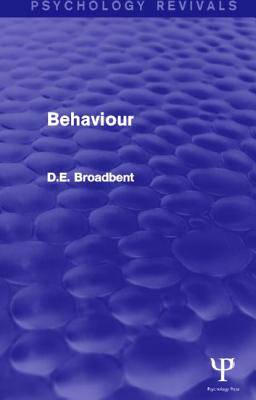
- Afhalen na 1 uur in een winkel met voorraad
- Gratis thuislevering in België vanaf € 30
- Ruim aanbod met 7 miljoen producten
- Afhalen na 1 uur in een winkel met voorraad
- Gratis thuislevering in België vanaf € 30
- Ruim aanbod met 7 miljoen producten
Omschrijving
Original blurb from 1961: For most laymen the science of behaviour hardly exists. Few people have any clear idea of its methods, its history or, above all, its significance. Beside the popular interest aroused, for example, by the achievements of Freud, the work of the behaviourists is almost unknown. Yet this is a science which is of the highest importance, has practical applications of immediate use, and offers the hope of profound insights into the human mind.
What distinguishes the behaviourists is their insistence on exact scientific verification. Introspection may suggest a theory but only objective experiments will be admitted as evidence in its favour. The observation of how a rat behaves in a maze may seem a far cry from the study of mankind but it has the supreme advantage that what is observed can be exactly recorded and analysed. Progress by such methods is slow but what is discovered is much less likely to be upset by future discoveries than is work based on subjective judgments.
Some of the results already obtained are fruitful and suggestive. Mr Broadbent's treatment of rewards and punishments is most striking, both for the importance of the results and for the precision of the methods by which they are obtained. To reward a child for doing something or to punish him for abstaining might seem to be equally effective methods, to be distinguished only on ethical grounds. Mr Broadbent, however, sets out modern evidence and opinion about the means by which each method operates and so demonstrates that there exist sharp and general rules governing the situations in which each is likely to be effective. He describes the state of 'neurotic' conflict produced when a reward and a punishment are both associated with the same object and again a series of simple, controlled experiments throws light on a basic human problem.
The science of behaviour is closely linked with other branches of research such as the theory of information and the development of electronic and mechanical 'brains', and this common field of research promises exciting results. Mr Broadbent shows how behaviourism has grown towards such sophisticated developments from the beginnings of such men as Watson and Pavlov.
To any intelligent reader this book will give not only the pleasure of watching a series of brilliantly devised experiments gradually giving birth to a new and important science, but also the insight which comes from examining such basic concepts as memory and learning, of discovering how much of what we think we know is merely an unexamined assumption, and of being forced to think again in precise terms. For anyone willing to make this effort Behaviour is an exceptionally rewarding book.
Specificaties
Betrokkenen
- Auteur(s):
- Uitgeverij:
Inhoud
- Aantal bladzijden:
- 216
- Taal:
- Engels
- Reeks:
Eigenschappen
- Productcode (EAN):
- 9781848723351
- Verschijningsdatum:
- 7/11/2013
- Uitvoering:
- Hardcover
- Formaat:
- Genaaid
- Afmetingen:
- 138 mm x 216 mm
- Gewicht:
- 452 g

Alleen bij Standaard Boekhandel
Beoordelingen
We publiceren alleen reviews die voldoen aan de voorwaarden voor reviews. Bekijk onze voorwaarden voor reviews.











